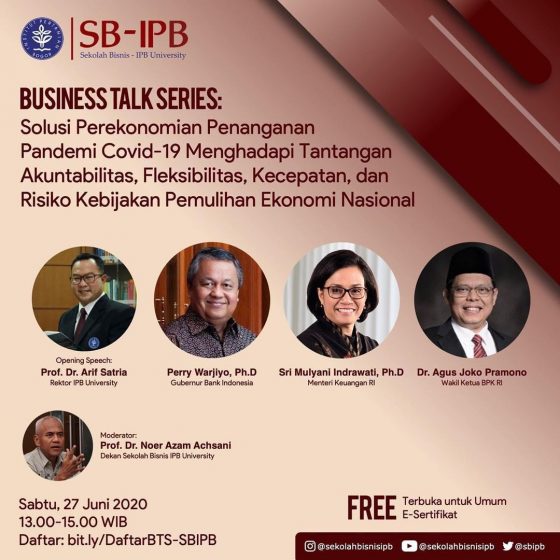
Business Talk Series # 6: National Economic Recovery Strategy in Handling the Pandemic COVID 19
Bogor, 27 June 2020 – School of Business, IPB University (SB-IPB) again held the sixth edition of the Business Talk Series (BTS) webinar on Saturday (27/6). In collaboration with the Ministry of Finance, Bank Indonesia, and the Supreme Audit Agency, the webinar carries the theme “Economic Solutions for Handling the Covid-19 Pandemic Facing the Challenges of Accountability, Flexibility, Speed and Risk of National Economic Recovery Policy”. The webinar takes place through a virtual zoom meeting room and live streaming via the IPB Business School Youtube account.
The sixth edition of the Business Talk Series presented three speakers, including 1) the Minister of Finance of the Republic of Indonesia, Sri Mulyani Indrawati, PhD, delivered a topic regarding the Strategy and Implementation of the National Economic Recovery Program in Handling the Covid-19 Pandemic; 2) Governor of Bank Indonesia, Perry Warjiyo, PhD, spoke about BI’s support for the National Economic Recovery and the State Budget; and 3) Deputy Chairman of the Republic of Indonesia Supreme Audit Agency, Dr. Joko Agus Pramono conveyed the topic of the State Financial Management and Accountability Audit Strategy in Handling the COVID-19 Pandemic. Rector of IPB, Prof. Dr. Arif Satria, SP, MSi gave a speech as well as officially opened the webinar business talk series. Dean of SB IPB, Prof. Dr. Ir Noer Azam Achsani acted as moderator. The webinar was opened by Zahraa Zaahirah Abidin, SBns as the host at 13.00 WIB, attended by various stakeholders consisting of partners, lecturers, students, alumni, and the general public who work as businessmen, executives, politicians, bureaucrats and NGOs.
The dynamics of the covid-19 pandemic in the world spread quickly and widely in a short time creating a health crisis with vaccines, drugs, as well as limited equipment and medical personnel. This pandemic has a domino effect on social, economic and financial aspects. The cessation of economic activities has an impact on employment, consumption, investment and export-import activities.
Sri Mulyani Indrawati, PhD said that “The slowdown occurred in all components affecting Indonesia’s economic growth so that it only grew 2.97% in the first quarter of 2020. Sectoral growth in the main sectors supporting the national economy also experienced a slowdown, the primary sector consisting of agriculture and mining only grew 0.18%, the secondary sector consisting of manufacturing, construction, electricity, gas and water grew 2.38%, and the tertiary sector which consisted of trade, information and communication, transport and warehouse, financial services and insurance, and other services. ”
“State income and state spending also experienced negative growth compared to last year, while state spending, meanwhile, had an increase in nominal terms and the ratio to GDP was higher than in the last three years. The budget for handling covid-19 to handle health, social protection, support for MSMEs, the business world, and local governments reaches a deficit of Rp.695.20 trillion. ” he continued.
In terms of monetary policy and monetary operations, Bank Indonesia provides support for the recovery of the national economy and the State Budget through the authority of BI as regulated in Law No.2 of 2020 concerning the stipulation of Perppu number 1 of 2020 concerning state financial policy and financial system stability for handling Covid-19 and / or in the context of facing threats that endanger the national economy and / or financial system stability, it becomes a law. “Bank Indonesia’s policy mix for national economic recovery in handling COVID-19 is carried out through six aspects, including (1) lowering interest rates; (2) stabilization of the rupiah exchange rate; (3) money and foreign exchange markets; (4) loosening of liquidity; (5) macroprudential easing; and (6) payment system ”said Perry Warjiyo, PhD as Governor of BI.
Furthermore, Deputy Chairman of the Supreme Audit Agency, Dr. Joko Agus Pramono, said that the role of BPK in handling Covid-19 in Indonesia is to ensure accountability for All is appropriate, transparent, accountable and obedient to the provisions of emergency conditions. Furthermore, the discussion and question and answer session took place interactively. Prof. Azam as the moderator asked several questions which were summarized from the various questions of the webinar participants which were conveyed through the chat room on the Zoom application and Youtube. The webinar event was closed with a close statement from Prof. Arif Satria as the Chancellor of IPB University before being returned to the presenter. At the end, the webinar participants responded positively to the business talk series. (FK)


National Seminar HA SB-IPB
The IPB University Business School Alumni Association holds a National Seminar every Friday through Zoom Meetings at 09.00 – 10.30 WIB in June 2020, the number of participants who took part in this discussion was 50-200 people. The purpose of holding this discussion seminar is to broaden knowledge and discuss actual issues and a means of gathering various stakeholders. This discussion seminar was held starting from May, in June it was held 4 times.
Friday, June 5, 2020, the sixth discussion was held which invited resource persons Dr. Ir. Sri Hartono, MM, CMA, CHRA. He is the CEO of BMS Group, CEO of PT. Catur Pilar Jaya, Secretary General of AACIM and UMB Jakarta Postgraduate lecturer. This seminar was moderated by Muhammad Harun Al Rasyid, STP, MM. This fifth discussion raised the theme “Tips and Tricks on Marketers’ Challenges in the New Normal Era”, which discussed changes due to the Covid-19 pandemic which had an impact on changes in consumer behavior, people’s purchasing power, distribution systems, product variations, access to information, and also the price issue. In addition, the discussion this time discussed 9 steps to survive in the New Normal era, including optimizing social media and staying connected with customers, ensuring the most responsive brand, providing the best service, building a deep impression and other important tips.
The theme carried in the discussion of the seven alumni associations of the IPB University Business School on 12 June 2020 was “Predicting the impact of the New Normal on Public Health and the Economy”. The discussion material was explained by the resource person, Prof. Dr. Ir. Hermanto Siregar, M.Ec. He conveyed that when the normal era of the economy was in balance, then the shock or shock of the Covid-19 pandemic made the economy unbalanced so that it had to make adjustments, there were several options including leaving it “to nature” to do (Herd Immunity) or implement intervention / policy government; overcoming the source of shocks and overcoming the socio-economic impact caused by the source of shocks.
The following week’s discussion will be on June 19, 2020. The theme carried is “Enterprise Risk Management” with the resource person, Admiral Madya (ret) TNI Dr. Desi Albert Mamahit, M.Sc and Moderator Resista Vikaliana, S.Si, MM. Enterprise Risk Management (ERM) is a series of methodologies and procedures used to identify, measure, monitor and control risks arising from all business activities, including credit risk, operational risk, and other risks in an effort to maximize corporate value. This ERM will be beneficial for companies in the New Normal era so that the company can survive and keep developing. The ninth discussion on June 26, 2020, the IPB Business School Alumni Association invited Dr. Sufrin Hannan, EPC. and Moderator Zahraa Zahira with the theme of the discussion “Post-Pandemic Passion and Purpose; a “Coaching” approach. There are 3 points of discussion in this discussion, namely Pandemic and “Leader” Strategy Change, understanding and developing passion and purpose, and the Coaching approach. The discussion of the IPB University Business School Alumni Association will continue in the following month, it is hoped that this discussion is in accordance with predetermined goals, namely increasing knowledge of actual issues and policies in addressing certain matters.

Selection for Doctoral Program (S3) Period 1 of 2020
IPB University Business School has conducted student admissions selection for the Doctoral Program of Management and Business Period 1 of 2020 on 19-20 June 2020. The selection is carried out in the form of interviews conducted by prospective students to present their plans dissertation proposal that has been made and explains the background, strong motivation and achievement targets that you want to achieve if you take the SB-IPB University Management and Business Doctoral Program.
The selection this time was quite different because the interviews were conducted online through the Zoom Clouds Meeting. This is because they are still facing the Covid-19 pandemic conditions which still need to implement a Large-Scale Social Restriction (PSBB) policy. With adequate preparation between prospective students and the selection committee and evaluators consisting of lecturers and professors of SB-IPB and Postgraduate IPB, the admission selection can run well and smoothly. The ease of technology to support the SB-IPB agenda continues as usual.
IPB University Business School opens admissions to the Doctor of Management and Business Program twice a year. While lectures will begin when the second period of admission is completed, namely in August. Registration is also done online via the www page. admisi.ipb.ac.id. SB-IPB is opening admissions for the 2020 Period II Doctor of Management and Business Program with a deadline for registration on August 15, 2020.
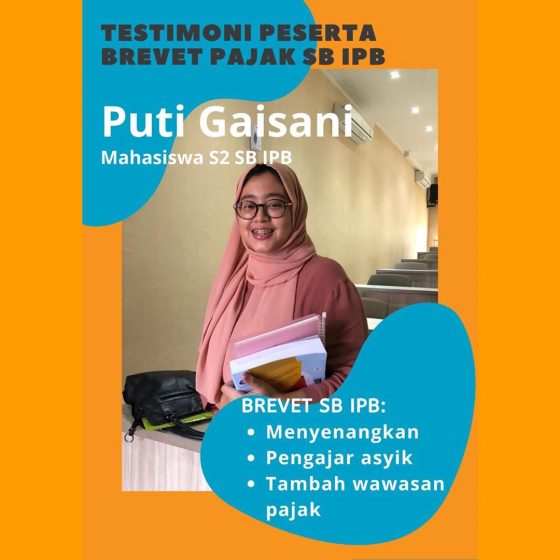
Tax Brevet Training by SB IPB
Most people know taxes only to fulfill their obligations to the state, without have sufficient knowledge whether it is correct according to the applicable regulations. To understand taxes that we pay, we must understand comprehensively from the legal aspects of the tax, basis tax imposition, tax determination, tax disputes, and the rights and obligations of taxpayers.
To accommodate these needs, SB IPB initiated the AB Tax Brevet Training held every Saturday. This training includes 18 meetings that lasted sinceNovember 30, 2019 to April 11, 2020. By attending the AB Tax Brevet Training, benefits the participants got were as follows:
- The Brevet AB Tax Training Certificate will be an added value when applying for work
- Accelerate tax analysis skills so as to facilitate work, especially those occupied accounting and tax position.
- For managers, understanding the science of taxation will allow them to control and check their employees work related to taxation
- Creating skilled tax staff
- Preparation to take Tax Consultant Certification, both for personal and corporate purposes needed at this point
- Provide technical knowledge regarding tax reporting and calculation
The material presented at the AB Tax Brevet Training includes: KUP, PBB, BPHTB, BM, PPh Pot / Put, PPN,OP PPh, Corporate Income Tax, Tax Accounting, and e-SPT. The training is delivered using the learning method theory and practice, enriched with discussions, cases, and exercises. Practitioners who are competent, experienced, and certified tax consultant (BKP) supports the delivery of learning materials well. In addition, this training also provides facilities in the form of coffee breaks, lunch boxes, modules and certificates for the participants.
AB’s Tax Brevet Training contained various positive responses from the participants. Puti Gaisani, participant from the SB IPB Masters program said that while studying Brevet SB IPB was very fun, especially the teachers are engrossed in and add insight into taxes. Rachmat Ramadhan, participants from Pancasila University also said that the implementation of this training was good, the committee was alert,and existing facilities are very supportive of learning. AB Tax Brevet Training participants consist of: various backgrounds, such as entrepreneurs, private employees, both undergraduate and postgraduate students graduates from IPB and non-IPB. So much public interest in this training, even before the end of the training, there were dozens of potential participants who had registered for the training next session.
The admin of the AB Tax Brevet Training is a student of class R62 for Master of Management Study Program and SB-IPB Business. This activity provides an experience for the R62 class to implement knowledge from lectures into real practice such as how marketing strategies, management HR in organizations, financial management in business activities and other administrative processes. In the process, the R62 Class also gained experience in the form of challenges and how looking for solutions to these challenges in a business activity. This R62 Class activity is also supported by the leadership, lecturers and academic staff of the IPB Business School so that the AB Tax Brevet Training it can go smoothly. The net proceeds from AB’s Tax Brevet Training activities are partly used for donationshumanity related to the Covid-19 pandemic that is currently ongoing and some others used to support the academic activities of Class R62. Hopefully AB’s Tax Brevet Training activities this can be an inspiration for other students and bring benefits to the training participants, SB IPB and the parties involved in this activity.
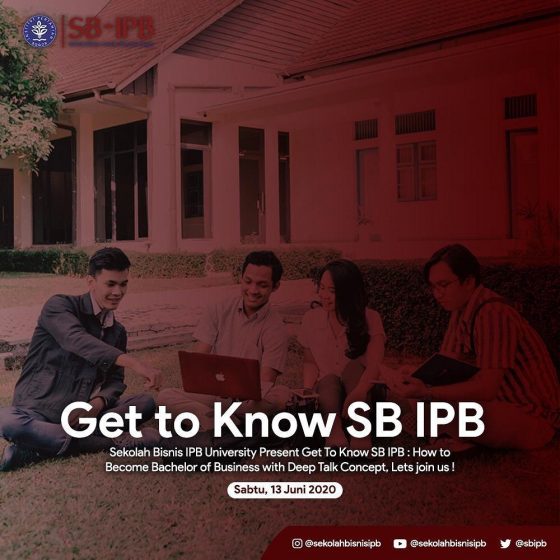
GET TO KNOW SB-IPB: How to Become a Bachelor of Business with Deep Talk Concept
Business School Bogor Agricultural University in cooperation with the BEM SB-IPB has been carrying the theme of “GET TO KNOW SB-IPB: How to Become a Bachelor of Business” . This activity was carried out online on June 13, 2020 through the Zoom Clouds Meeting. This activity was carried out with the concept of Deep Talk. In accordance with the theme, this activity aims to get to know more about the IPB University Bachelor of Business Study Program. The participants of this activity consisted of high school students and equivalent, Counseling Guidance Teachers (BK), and parents of students. This activity was attended by general participants as well as those invited specifically by SB-IPB. Present as moderator was the Chairman of the SB-IPB Admissions and Public Relations Commission (Andina Oktariani SE, M.Si). Submission of the IPB University Undergraduate Business Study Program by the Dean of the IPB University Business School (Prof. Dr. Ir. Noer Azam Achsani, MS), while information related to the entry pathway for the IPB University Undergraduate Business Study Program was delivered by the Head of Sub-Directorate for Admissions and Registration of New Students of IPB University Dr. Utami Dyah Syafitri, S.Si, M.Si).
Participants in the activity carried out interactive discussions because they were enthusiastic about the explanations presented regarding the Bachelor of Business study program. Some of them are participants who really want to enter the IPB University Bachelor of Business Study Program through various channels provided by IPB University. Seeing the enthusiasm of the participants, the second session of Get to Know SB-IPB will be released soon. This can be a place for students, teachers and parents to find out in detail about the IPB University Bachelor of Business Study Program. How to become a Bachelor of Business and what you need to prepare to join the Bachelor of Business of IPB University.
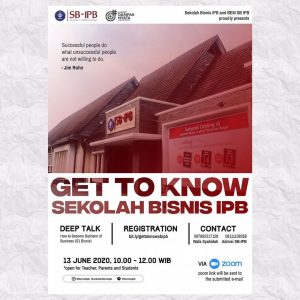
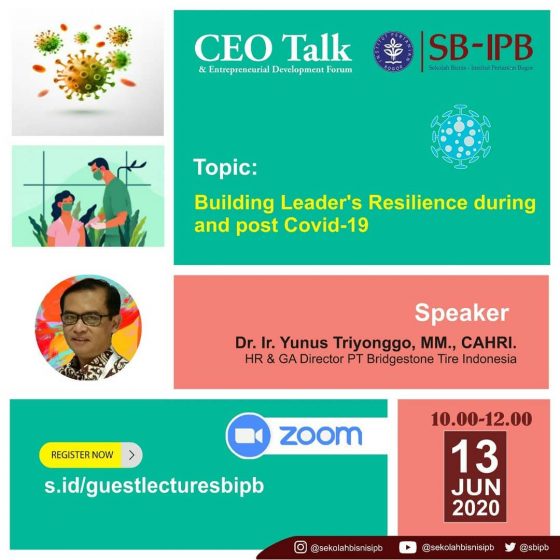
CEO Talk & Entrepreneurial Development Forum: Building Leader’s Resilience During and Post Covid-19
Mr. Ir. Yunus Triyonggo, MM., CAHRI, who is the HR & GA Director of PT Bridgestone Tire Indonesia, was a resource person in the E70 class of Business Management (KSMB) on Saturday, June 13, 2020 at 10.30-12.00 WIB. He completed his undergraduate education (S1) from the Department of Agricultural Industrial Technology of IPB University, Masters (S2) in Management from Diponegoro University and a Doctor of Management and Business from SB-IPB University. He has worked at various top companies such as Indofood, Sampoerna, Unilever, and Nestle. On this occasion he delivered material “Building Leaders Resilience during and post Covid-19”.
The speakers conveyed facts about conditions during the Covid-19 outbreak such as increasing unemployment, declining GDP, and declining economic growth around the world. There are several business sectors that have collapsed but there are also business sectors that have developed during a pandemic. This requires business people to be able to face these challenges in order to survive and adapt to transformation.
Resilience is the ability to adapt in challenging circumstances. Then, who are the resilience leaders? Resilience leaders have (1) the ability to cope with disruption, changes in direction and adversity, without engaging in dysfunctional behavior, and (2) the ability to adapt under immense pressure, all whilst maintaining their high energy, and continuing to instill confidence in their employees and customers. To build resilience leaders, a leader needs to have the characteristics of self-leading, physical well-being, supportive networks, coping skills, flexibility of thought, and a positive attitude.
There are 6 tips that can be implemented with the team to stay afloat: (1) have an informal check-in daily, (2) communicate and then communicate some more, (3) spread the word around when good things happen, (4) keep feedback lines open, (5) be aware of specific challenges faced by all, and (6) be patient. For example, there are several cases of companies responding quickly to the Covid-19 pandemic such as Ms. Nurhayati Subakat from PT Paragon Technology and Innovation who provided medical equipment and personal protective equipment, Mr. Garibaldi Thahir from PT Adaro Energy Tbk who initiated to work together, synergize with all parties in overcoming and accelerating the response to Covid-19, Mr. Chairul Tanjung from CT Corp who is working with several companies to build a Health Care Unit (HCU) ward and ICU at Airlangga Hospital Surabaya. Business people are required to adapt by transforming their business.
After presenting the material, students actively discussed and shared experiences during the Covid-19 pandemic. There were some students who took the opportunity to develop a pest-control business through room disinfectants and hand-sanitizers, some also transformed by producing masks. Resilience leaders are required to move fast (speed), agility to change, and carry out a faster cycle or faster PDCA. Thank you very much Mr. Yunus, hopefully you can come to SB-IPB in person next time.
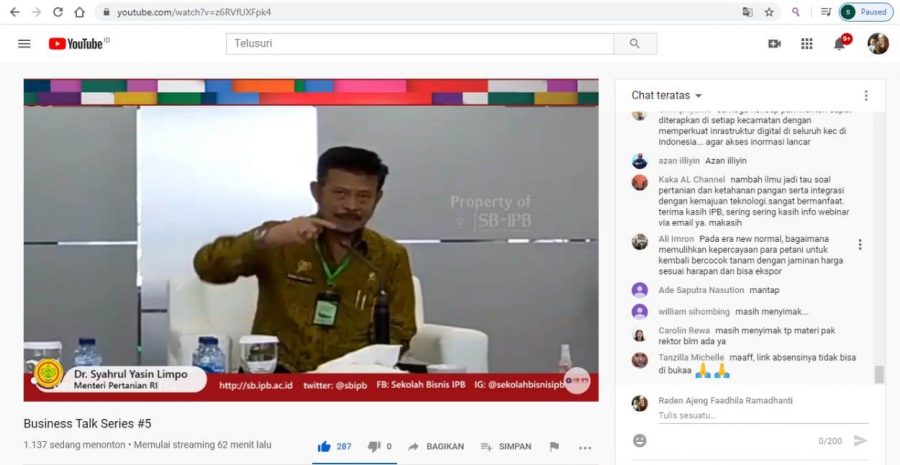
Strategi Ketahanan Pangan di Era New Normal Pandemi Covid 19
Jakarta, 9 Juni 2020—Badan Keahlian DPR RI dan Sekolah Bisnis IPB University (SB-IPB) bekerja sama mengadakan Webinar yang mengusung topik “Strategi Ketahanan Pangan di Era New Normal Pandemi Covid 19” pada Selasa (9/6), membahas mengenai pandemi Covid-19 yang melanda Indonesia sejak bulan Februari 2020 telah berdampak pada berbagai sektor, salah satunya sektor pertanian karena merupakan sektor yang melakukan pemenuhan terhadap kebutuhan dasar masyarakat seperti kebutuhan pangan yang meliputi pertanian pangan, ternak, sayuran dan buah buahan, serta perkebunan. Sektor pertanian menjadi sangat penting pada masa pandemi Covid-19 karena berkaitan erat dengan ketahanan pangan.
Dalam webinar ini menghadirkan para narasumber, yaitu 1) Menteri Pertanian RI, Dr. Syahrul Yasin Limpo yang mengangkat topik tentang “Kebijakan Pemerintah dalam Menjamin Ketahanan Pangan Di Era New Normal Pandemi Covid 19; 2) Ketua Komisi IV DPR RI, Sudin, SE berbicara seputar tentang “Implementasi Fungsi Pengawasan dan Legislasi DPR RI dalam Menjamin Ketahanan Pangan Di Era New Normal Pandemi Covid 19”; dan 3) Rektor IPB University, Prof. Dr. Arif Satria, SP., M.Si. menyampaikan topik tentang “Inovasi Perguruan Tinggi Untuk Menjamin Ketahanan Pangan Di Era New Normal Pandemi Covid 19”. Bertindak sebagai moderator yaitu Dekan SB-IPB, Prof. Dr.Ir. Noer Azam Achsani, MS. Webinar ini terbuka untuk umum dan dihadiri oleh berbagai stakeholder yang terdiri dari legislatif, eksekutif/pemerintah, dosen, mahasiswa, praktisi bisnis, dan masyarakat dengan berbagai jenis profesi.
Ketahanan pangan menjadi salah satu hal yang penting pada saat pandemi Covid 19 karena dapat mengakibatkan berbagai permasalahan di antaranya terganggunya produksi, distribusi, dan konsumsi kebutuhan pokok akibat diberlakukannya pembatasan sosial berskala besar dan larangan perjalanan bagi masyarakat. Kondisi ini dapat memicu kekhawatiran jika Indonesia akan mengalami krisis pangan. Hal ini dikuatkan dengan pendapat Organisasi Pangan Dunia atau Food and Agriculture Organization (FAO) yang menyampaikan akan adanya ancaman kelangkaan pangan di masa pandemi Covid 19.
”Terdapat 3 agenda utama pada masa pandemi Covid 19, yaitu pertama agenda darurat/jangka pendek yang terdiri dari stabilitas harga pangan termasuk pengendalian harga, fasilitas pembiayaan petani dan padat karya pertanian; yang kedua adalah agenda temporary/menengah diversifikasi pangan lokal, supporting daerah-daerah defisit dan antisipasi kekeringan; dan yang ketiga agenda permanen/jangka panjang yakni ekstensifikasi tanaman pangan, peningkatan produksi per tahun, pengembangan korporasi petani dan pengembangan para petani milenial,” ujar Menteri Pertanian.
Berdasarkan data dari Kementerian Pertanian diketahui perkiraan ketersediaan pangan strategis nasional untuk bulan Maret hingga Agustus 2020 yakni untuk beras tersedia 25,6 juta ton dari kebutuhan 15 juta ton; jagung sebanyak 13,7 juta ton dari kebutuhan 9,1 juta ton; bawang merah tersedia 1,06 juta ton dari kebutuhan 701.482 ton; dan cabai besar tersedia 657.467 ton dari kebutuhan 551.261 ton. Selanjutnya, daging kerbau/sapi tersedia 517.872 ton (290.000 ton diantaranya berasal dari impor) dari kebutuhan 476.035 ton; daging ayam ras 2 juta ton dari kebutuhan 1,7 juta ton; minyak goreng 23,4 juta ton dari kebutuhan 4,4 juta ton; dan stok gula pasir yang terdapat di gudang distributor sebanyak 159.000 ton. Meskipun berdasarkan data Kementerian Pertanian stok pangan nasional mengalami surplus namun hal ini bukan berarti Indonesia terbebas dari ancaman krisis pangan. Hal ini dikarenakan pandemi Covid-19 belum pasti kapan akan berakhir.
Dalam rangka menjamin ketahanan pangan di masa pandemi Covid 19 di Indonesia, Pemerintah telah menyiapkan berbagai strategi seperti memantau stabilitas harga kebutuhan pokok agar tidak meroket dan meningkatkan produksi pangan nasional berbasis pertanian rakyat serta keberpihakan kepada petani kecil. Untuk mewujudkan hal ini Pemerintah melakukan realokasi anggaran yang lebih besar untuk dialokasikan pada bantuan benih/bibit, program padat karya, stabilisasi stok dan harga pangan, dan distribusi dan transportasi pangan.
Selain itu upaya lain yang dilakukan oleh Pemerintah dalam rangka menjamin ketahanan pangan yaitu memberlakukan new normal. New normal merupakan langkah yang diambil Pemerintah untuk memulihkan kehidupan sosial dan ekonomi. Penerapan new normal yang dilakukan oleh Pemerintah merujuk pada indikator yang dikeluarkan oleh World Health Organization (WHO) dengan beberapa penyesuaian berdasarkan kebutuhan Pemerintah.
”Sektor pertanian merupakan sektor strategis dan harus mendapatkan perhatian karena memiliki jumlah tenaga kerja yang besar, dimana produksi mengalami penurunan tetapi konsumsi tinggi. Tantangannya adalah bagaimana memenuhi kebutuhan pangan masyarakat guna menjamin ketahanan pangan dan di sisi lain juga berperan terhadap pemulihan ekonomi,” ujar Ketua Komisi IV DPR.
Keberadaan perguruan tinggi menjadi sangat penting dalam pencapaian pembangunan pertanian di Indonesia karena perguruan tinggi dapat memberikan pandangan, pemikiran, dan masukan terhadap strategi kebijakan yang akan diambil oleh Pemerintah serta menciptakan inovasi yang mampu menjamin ketersediaan pangan di era new normal pandemi Covid 19.
”Stimulus ekonomi dan kemandirian pangan adalah penting untuk bertahan pada era pandemi Covid 19, solusi dalam ketahanan pangan adalah pengembangan produksi skala rumah tangga dan substitusi impor, IPB sudah dan akan terus melakukan pengembangan inovasi yang menggandeng para petani milenial dalam produksi pangan untuk menyuplai kebutuhan-kebutuhan pangan di kota-kota besar di seluruh Indonesia,” ujar Rektor IPB University.
Dokumentasi video https://www.youtube.com/watch?v=z6RVfUXFpk4

New Normal Preparation: Health Protocol SB-IPB
IPB University officially published a circular regarding the determination of the start of the 2020/2021 academic year and the implementation of academic and student activities on June 10, 2020. With this circular, Prof. Dr. Arif Satria, M.Si. as the chancellor implements academic activities at IPB University in a New Normal Order. In the previous circular, the leadership of IPB University decided to gradually relax the restrictions on entering the IPB campus (Partially Close Down) since May 30, 2020 with work protocols in the new normal situation (new normal).
Learning and working at home activities are still carried out online or other non-face-to-face methods, but each IPB work unit (including SB-IPB) has implemented staff assignments for pickets on every working day. This makes SB-IPB prepare adequate health protocols to support the policies issued by IPB University.
Some of the health protocols in the new normal order that have been implemented by SB-IPB are the protocol for entering the campus by checking the temperature by security officers, providing warning signs to apply social / physical distancing both when entering campus and at lobby spots and services on campus, providing hand sanitizers at every corner of the campus, facilitating SB-IPB staff and lecturers by distributing masks and face shields, disseminating unhealthy staff or lecturer rules for Work From Home and still minimizing the presence of face-to-face services and agendas by maximizing technology and online admin.
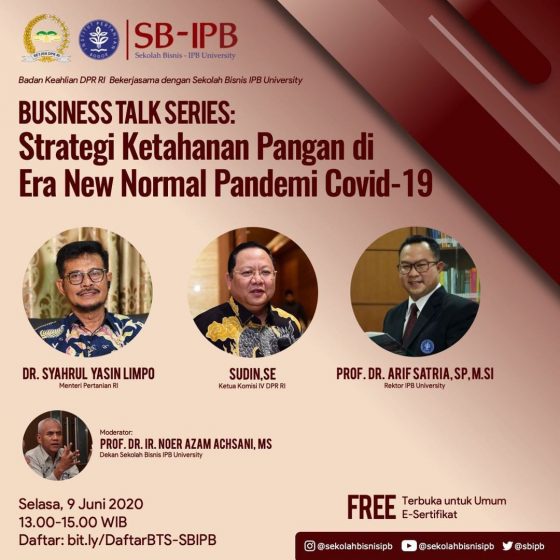
Business Talks Series # 5: Food security strategy in the New Normal Era of the COVID 19 Pandemic
Jakarta, June 9, 2020 – The DPR RI Expertise Agency and the IPB University Business School (SB-IPB) are collaborating to hold a Webinar on the topic “Food Security Strategies in a New Era Normal Covid-19 Pandemic “on Tuesday (9/6), discussed the Covid-19 pandemic that has hit Indonesia since February 2020 which has had an impact on various sectors, one of which is the agricultural sector because it is a sector that fulfills people’s basic needs such as food needs. which includes food agriculture, livestock, vegetables and fruits, and plantations. The agricultural sector is very important during the Covid-19 pandemic because it is closely related to food security.
In this webinar, there were speakers, namely 1) Minister of Agriculture, Dr. Syahrul Yasin Limpo who raised the topic of “Government Policy in Ensuring Food Security in the New Normal Era of the Covid-19 Pandemic; 2) Chairman of Commission IV DPR-RI, Sudin, SE, talks about “Implementation of the Supervision and Legislation Function of the House of Representatives in Ensuring Food Security in the New Normal Era of the Covid Pandemic19”; and 3) Rector of IPB University, Prof. Dr. Arif Satria, SP., M.Si. delivered a topic about “Higher Education Innovations to Ensure Food Security in the New Normal Era of the Covid-19 Pandemic”. Acting as moderator, namely the Dean of SB-IPB, Prof. Dr.Ir. Noer Azam Achsani, MS. This webinar is open to the public and attended by various stakeholders consisting of the legislature, executive / government, lecturers, students, business practitioners, and people with various types of professions.
Food security is one of the important things during the Covid-19 pandemic because it can lead to various problems including disruption in production, distribution and consumption of basic necessities due to the imposition of large-scale social restrictions and travel restrictions for the community. This condition can trigger concern if Indonesia will experience a food crisis. This is reinforced by the opinion of the World Food and Agriculture Organization (FAO) which conveyed the threat of food scarcity during the Covid-19 pandemic.
“There are 3 main agendas during the Covid-19 pandemic, namely the first is an emergency / short-term agenda consisting of food price stability including price control, farmer financing facilities and labor-intensive agriculture; the second is a temporary / medium agenda of local food diversification, supporting deficit areas and anticipating drought; and the third agenda permanent / long term the extension of food crops, increased production per year, corporate development of farmers and the development of farmers millennial, “said Minister of Agriculture
Based on data from the Ministry of Agriculture known to estimate the availability of strategic food nationwide for the month of March to August 2020 ie to available rice 25.6 million tonnes of the need for 15 million tonnes; corn as much as 13.7 million tonnes of the need for 9.1 million tonnes; available shallots 1.06 million tons of the need for 701,482 tons; and large chilies available 657,467 tons from a need of 551,261 tons. Furthermore, available buffalo / beef 517,872 tonnes (290,000 tonnes of which come from imports) of the need for 476,035 tonnes; broiler chicken meat 2 million tons of the need for 1.7 million tons; cooking oil 23.4 million tons of the need for 4.4 million tons; and the stock of sugar in the distributor’s warehouse as much as 159,000 tons. Although based on data from the Ministry of Agriculture, the national food stock is experiencing a surplus, this does not mean that Indonesia is free from the threat of a food crisis. This is because the Covid-19 pandemic is uncertain when it will end.
In order to ensure food security during the Covid-19 pandemic in Indonesia, the Government has prepared various strategies such as monitoring the stability of prices for basic necessities so as not to skyrocket and increasing national food production based on people’s agriculture and siding with small farmers. In order to achieve this, the Government has made a larger budget allocation for seed assistance, labor-intensive programs, stabilization of food stocks and prices, and food distribution and transportation.
Apart from that, another effort made by the Government in order to guarantee food security is to impose a new normal. New normal is a step taken by the Government to restore social and economic life. The implementation of the new normal by the Government refers to the indicators issued by the World Health Organization (WHO) with several adjustments based on the Government’s needs.
“The agricultural sector is a strategic sector and should get attention because it has a large number of workers, where production has decreased but consumption is high. The challenge is how to meet people’s food needs in order to ensure food security and on the other hand also play a role in economic recovery, “said the Chairman of Commission IV DPR.
The existence of universities is very important in the achievement of agricultural development in Indonesia because universities can provide views, thoughts, and input on policy strategies that will be taken by the Government and create innovations that can ensure food availability in the new normal era of the Covid-19 pandemic.
“Economic stimulus and food independence are important to survive in the era of the Covid pandemic19, the solution in food security is the development of household scale production and import substitution, IPB has and will continue to develop innovations that collaborate with millennial farmers in food production to supply their needs. food in big cities throughout Indonesia, “said the Rector of IPB University.
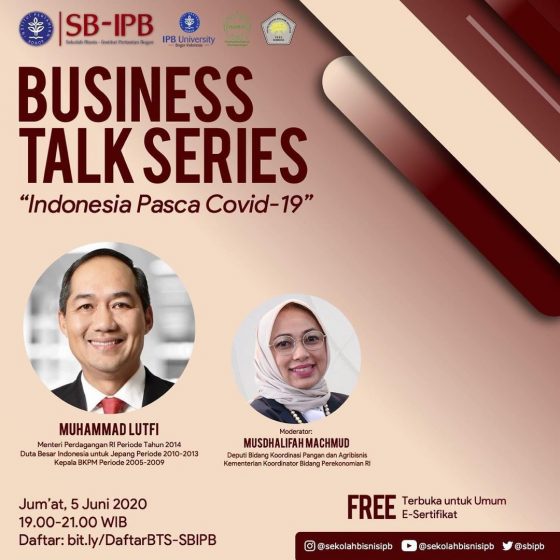
Business Talk Series (BTS) # 4: Indonesia Post-Covid-19
SB-IPB, Bogor – IPB University Business School held the 4th edition of the Business Talk Series (BTS) on June 5, 2020. With the theme “Indonesia Post Covid-19” Mr. Muhammad Lutfi, who has served as Minister of Trade of the Republic of Indonesia United Indonesia Cabinet II in 2014 was invited as a speaker. The online talk show was attended by 477 participants who joined through the virtual zoom room with a total of 1079 participants. Not only that, BTS # 4 is also broadcast through the official Youtube account of the IPB University Business School.
The online talk show was opened by Mrs. Musdhalifah Machmud as Deputy for Food and Agribusiness Coordination of the Coordinating Ministry for Economic Affairs of the Republic of Indonesia as well as moderator for BTS # 4 at 19.05 WIB. The speech was delivered by Mr. Arif Satria as the Chancellor of IPB University, followed by an introduction to SB IPB by Mr. Noer Azam Achsani as Dean of the IPB Business School. The presentation was delivered by Mr. Muhammad Lutfi at 19.30 WIB, starting with the latest data on fiscal stimulus (31/5) in six countries, namely the US, Brazil, Russia, UK, Spain and Indonesia in handling the Covid-19 pandemic. The trend in technology utilization is predicted to increase after Covid-19, including e-commerce, digital payments, remote working, and distance learning. There are four key areas for Indonesia to realize its digital ambitions, including building digital infrastructure, encouraging customer awareness and trust, developing a future workforce, and growing an innovation ecosystem and supporting local competitiveness.
Global megatrend is predicted to occur in 2045, this will coincide with 100 years of Indonesian independence. Asia Pacific will dominate world economic output, this should be an opportunity for Indonesia with its demographic bonus. Indonesia should be able to become a rich and developed country before it gets old, before the demographic bonus ends. Furthermore, the former Indonesian Minister of Trade explained three growth scenarios for Indonesia, including a base case scenario with an annual GDP growth of 5.1%, a high scenario with an annual GDP growth of 5.7%, and a super high scenario with an annual GDP growth of 6.4%. The industrial sector is the driver of economic growth with manufacturing and energy growth a necessity.
The discussion and question and answer session was very interactive. There were 13 questions asked, two of which were delivered directly. The enthusiasm of the participants was very high, coming from various regions and even across countries. BTS # 4 was relaxed and interesting, there were lots of insights for Indonesia after Covid-19. With difficulties there is convenience, together we can! (FK)






Recent Comments